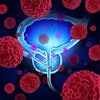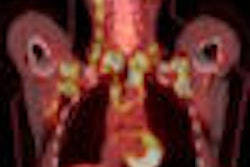Dear AuntMinnie Member,
This week we're highlighting study results showing that radiation dose can be cut dramatically -- with no effect on image quality -- in pediatric renal SPECT studies.
Researchers from Harvard Medical School in Boston used a relatively new data reconstruction algorithm rather than the standard filtered back projection (FBP) technique applied to most SPECT exams. The new method delivered high-quality images with just half of the photons used for FBP, according to a story by staff writer Wayne Forrest in our Molecular Imaging Digital Community. Learn more by clicking here.
We're also highlighting two stories on molecular imaging from last week's American Academy of Neurology (AAN) meeting in Seattle. In the first, researchers found that PET with a new radiotracer -- Pittsburgh Compound B (PiB) -- can help physicians distinguish between dementia patients with Alzheimer's disease and those with Lewy body dementia. In the second, whole-body PET found 20% more cancers than other tests in patients with suspected paraneoplastic neurological disorders.
You'll find these stories and more in our Molecular Imaging Digital Community, at molecular.auntminnie.com.




















